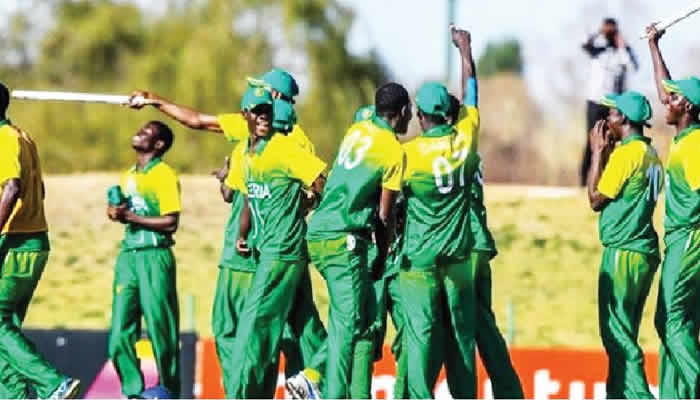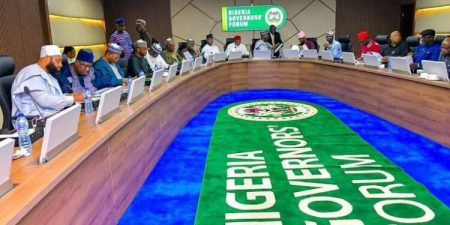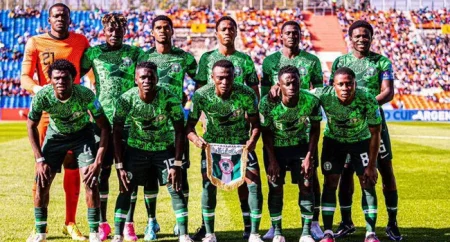The Nigerian men’s cricket team, known as the Yellow Greens, concluded their campaign in the Pearl of Africa T20 Series with a disappointing string of losses, managing only a single victory against Namibia amidst a challenging schedule against stronger cricketing nations. The tournament, hosted in Uganda, saw Nigeria face off against Kenya, Uganda, the United Arab Emirates (UAE), and Namibia, all of whom boasted superior rankings and experience. The Yellow Greens struggled to find consistent form throughout the series, grappling with both batting and bowling inconsistencies that ultimately hampered their progress. Their solitary win provided a glimmer of hope, showcasing their potential to compete at a higher level, but the overall performance highlighted the need for continued development and improvement in various aspects of their game.
Nigeria’s journey in the tournament began with a narrow defeat against Kenya in a rain-affected match, followed by a substantial loss to the host nation, Uganda. These initial setbacks set the tone for their subsequent encounters, as they struggled to contain the opposition batsmen and build competitive totals of their own. A subsequent loss to Namibia further dented their confidence, despite showing some fight with the bat. Their encounter against the UAE exposed their batting vulnerabilities, culminating in a heavy defeat. While they managed to restrict Uganda’s scoring in their second meeting, the Yellow Greens faltered in the chase, falling short of victory once again.
The team’s solitary triumph against Namibia offered a brief respite from the string of losses, demonstrating their resilience and ability to perform under pressure. Defending a modest total, the Nigerian bowlers displayed discipline and accuracy, stifling the Namibian batsmen and securing a thrilling victory. This win, however, proved to be an isolated bright spot in an otherwise challenging tournament. A subsequent heavy loss to the UAE underscored the gap in quality between Nigeria and the more established cricketing nations. The final match against Kenya, despite a spirited effort, resulted in another defeat, bringing their campaign to a disappointing end.
Despite the string of losses, several individual performances provided glimpses of promise for the future. Captain Sylvester Okpe led from the front with the bat, accumulating a century of runs over the course of the tournament. Prosper Useni and Isaac Danladi also made valuable contributions with the bat, showcasing their potential to become consistent run-scorers for the team. With the ball, Captain Okpe, Peter Aho, and Taiwo Mohammed shared the bowling honors, each claiming seven wickets and demonstrating their ability to create opportunities for breakthroughs. These individual performances, while encouraging, highlighted the need for a more collective effort to achieve consistent success.
The Pearl of Africa T20 Series served as valuable exposure for the Nigerian team, providing them with the opportunity to compete against higher-ranked opponents and gain crucial experience in a competitive environment. The tournament exposed areas where the team needs to improve, particularly in their batting consistency and ability to handle pressure situations. While the results may not have been as desired, the lessons learned will undoubtedly serve as a stepping stone for their future development. The team’s management will need to analyze the performances closely, identify weaknesses, and formulate strategies to address these shortcomings in preparation for future tournaments.
Under the guidance of their coach, former Kenyan international Steve Tikolo, the Nigerian team will now focus on preparing for the ICC Men’s Africa T20 World Cup Qualifier scheduled for Zimbabwe. This tournament will provide another opportunity for the Yellow Greens to test their skills against some of the best teams in the region and strive for qualification to the global stage. The experience gained in the Pearl of Africa T20 Series, despite the setbacks, will be crucial in their preparations for the upcoming qualifier. The team will need to work on building their confidence, improving their consistency, and developing a more cohesive unit to achieve their goals in Zimbabwe.














